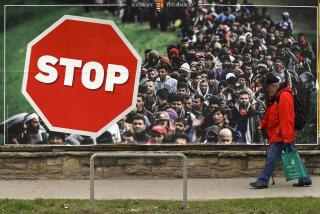Refugees Seeking New Lives in the West Are Stranded in Eastern Europe
- Share via
BUCHAREST, Romania — In the dozen years since he fled his native Sudan, Michael Kwan Mathed has wandered from country to country, trying to make his way to the West.
His journey ended in January at the Romanian-Hungarian border, when he was arrested with a forged South African passport that he bought in Greece for $500. He was convicted of attempting to illegally cross the border and sentenced to 15 months in prison.
Although he has been released, he is in limbo. Romanian authorities have denied his request for asylum and are considering charging him with entering the country illegally from Bulgaria.
“I’ve got no one left, no hopes and nowhere to go,” he says.
Mathed’s story could have been told by any one of hundreds of Sudanese, Bangladeshis, Sri Lankans, Kurds and citizens of other Asian and African countries trapped in Europe’s formerly communist countries.
The way to the West opened with the fall of the Iron Curtain in 1989 and the loosening of the Marxists’ tight controls on travel. Eastern Europe quickly became a popular route for tens of thousands of people fleeing war, poverty or repression.
But many people hoping to get to the wealthy West have gotten stuck in Romania and its neighbors after western European countries tightened rules for immigration and political asylum.
Germany negotiated agreements with its neighbors requiring them to take back any illegal immigrants who cross from their territory. As a result, the number of people trying to transit Poland has fallen, and countries farther back in the immigration pipeline have negotiated similar treaties.
Romania and Hungary, at whose border Mathed was caught, have such a treaty.
On another route, Italy began patrolling its coast against speedboats bringing illegal immigrants across the Adriatic Sea from Albania.
In the last five years, nearly 35,000 people have been caught trying to cross Romania’s borders illegally. Most are either jailed or detained until they can be sent home.
“The pressure at Romania’s borders is terrible, and this country can’t deal with it alone anymore,” said Col. Grigore Stamate, chief of Romania’s border police.
In a country where the average monthly salary is the equivalent of only $100, the government simply does not have the resources to deal with the problem, he said.
Official reports estimate there are more than 20,000 illegal migrants in Romania alone, mostly Asian men. The Bucharest office of the International Organization for Migration estimates the number at twice that.
Many use false documents to stay in Romania while they wait for an opportunity to continue west. In most cases, their goal is to reach Germany or Italy.
Officials in both Romania and its southern neighbor, Bulgaria, say it is too expensive to send back home those who are caught. Bulgarian officials put the cost of repatriating a single illegal immigrant at $5,000, five times the cost of housing and feeding a refugee for one year.
Poland and Hungary report that among the biggest groups trying to cross their countries are Afghans fleeing the chronic strife in their country.
Having come so far, many immigrants will take virtually any risk.
“Some of them are desperate and put themselves at extraordinary jeopardy,” said Liliana Mircescu, the Bucharest representative of the International Organization for Migration. “They often leave home with all their savings and return years later with a plastic bag and [are] even more desperate.”
Over the winter, Romanian border guards detained 72 Bangladeshi men, ages 18 to 50, headed west. Some were found barefooted and nearly frozen near Romania’s northeastern border with the former Soviet republic of Moldova. Others were picked up at the Hungarian border.
All of them applied for political asylum, but Romanian authorities considered them economic refugees seeking a better life in a rich country.
Held in a small army cabin in the Danube port of Giurgiu, 37 miles south of Bucharest, the Bangladeshis slept on dirty mattresses on a cement floor and shared food with Romanian soldiers. Once a week, the soldiers took them to public showers.
After months of uncertainty, they were put on a plane back to Bangladesh.
Mathed, 31, wants to avoid that fate. He was among thousands of college students who protested imposition of martial law in Sudan in the early 1980s. Since 1983, more than 1 million people have died in fighting and famine in the war between rebels of the predominantly black south and Sudan’s national government dominated by the Arabs of the north.
Mathed, a Christian, says it was the fear of religious persecution and the killing of his parents and sisters that prompted him to flee Sudan in 1984.
He wandered through Egypt, Turkey and Greece for more than 11 years and was trying to get to Switzerland when he was arrested.
He still wants to get to Switzerland, but says that now he would only go legally. If he can’t, he said, rather than returning to Sudan, “I would rather spend the rest of my life here.”
More to Read
Sign up for Essential California
The most important California stories and recommendations in your inbox every morning.
You may occasionally receive promotional content from the Los Angeles Times.













